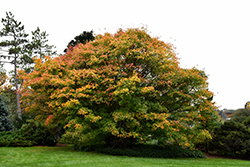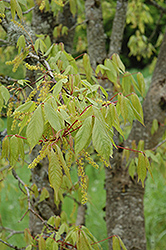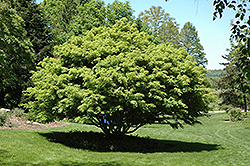Height: 25 feet
Spread: 20 feet
Sunlight:
![]()
![]()
Hardiness Zone: 5
Description:
This cultivar's unique leaf shape, combined with the tree's naturally beautiful structure make it an excellent choice for the garden as a focal point; a favorite for its lovely yellow fall color; leaf drop can occur in hot dry sites
Ornamental Features
Ivy-leaved Maple is primarily valued in the landscape for its ornamental upright and spreading habit of growth. It has attractive green deciduous foliage. The textured lobed compound leaves are highly ornamental and turn outstanding shades of yellow, orange and red in the fall. It produces tan samaras from early to mid fall.
Landscape Attributes
Ivy-leaved Maple is a multi-stemmed deciduous tree with an upright spreading habit of growth. It lends an extremely fine and delicate texture to the landscape composition which can make it a great accent feature on this basis alone.
This is a relatively low maintenance tree, and should only be pruned in summer after the leaves have fully developed, as it may 'bleed' sap if pruned in late winter or early spring. It has no significant negative characteristics.
Ivy-leaved Maple is recommended for the following landscape applications;
- Accent
- Shade
- Mass Planting
Planting & Growing
Ivy-leaved Maple will grow to be about 25 feet tall at maturity, with a spread of 20 feet. It has a low canopy with a typical clearance of 4 feet from the ground, and is suitable for planting under power lines. It grows at a slow rate, and under ideal conditions can be expected to live for 80 years or more.
This tree does best in full sun to partial shade. It does best in average to evenly moist conditions, but will not tolerate standing water. It is particular about its soil conditions, with a strong preference for rich, acidic soils. It is somewhat tolerant of urban pollution. This species is not originally from North America.


